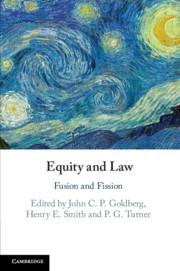Book contents
- Equity and Law
- Equity and Law
- Copyright page
- Contents
- Figures
- Table
- Contributors
- Acknowledgements
- Abbreviations
- Table of Cases
- Statutes
- 1 Fusion and Theories of Equity in Common Law Systems
- Part I Legal Systems and Legal Institutions
- Part II Fusion and Fission in Doctrine and Practice
- Part III Functional, Analytical and Theoretical Views
- 13 Wrongful Fusion
- 14 Avoiding Anarchy?
- 15 Equity and the Modern Mind
- 16 An Argument for Limited Fission
- 17 ‘Single Nature’s Double Name’
- Index
15 - Equity and the Modern Mind
from Part III - Functional, Analytical and Theoretical Views
Published online by Cambridge University Press: 26 July 2019
- Equity and Law
- Equity and Law
- Copyright page
- Contents
- Figures
- Table
- Contributors
- Acknowledgements
- Abbreviations
- Table of Cases
- Statutes
- 1 Fusion and Theories of Equity in Common Law Systems
- Part I Legal Systems and Legal Institutions
- Part II Fusion and Fission in Doctrine and Practice
- Part III Functional, Analytical and Theoretical Views
- 13 Wrongful Fusion
- 14 Avoiding Anarchy?
- 15 Equity and the Modern Mind
- 16 An Argument for Limited Fission
- 17 ‘Single Nature’s Double Name’
- Index
Summary
Rules are general in their scope and application, such that they inevitably produce injustice and hardship in particular cases. How might the law respond to this? The solution found in English law was provided by the Court of Chancery: particular cases can be held to fall outside the general rules, and equity be done accordingly. Before American Legal Realism became influential, this distinction was firm in the case law. However, Legal Realism has prompted lawyers to treat all law as equitable: all legal decisions are to respond to the particular facts of the case, and the judge is encouraged to decide cases in that way. This has removed the special quality of equitable rules.
- Type
- Chapter
- Information
- Equity and LawFusion and Fission, pp. 353 - 373Publisher: Cambridge University PressPrint publication year: 2019

